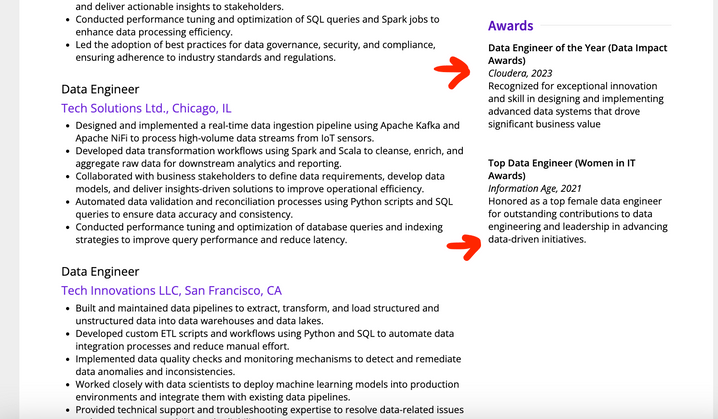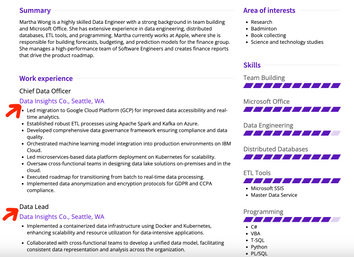
How to List Awards on Resume

Including an award on your resume can significantly boost your chances in a competitive job market. Awards provide tangible proof of your skills and excellence, helping you stand out from other candidates.
In this article, we’ll explore where to place awards on your resume, how to list them effectively, and which types of awards to include. We’ll also cover common mistakes to avoid and offer practical examples to help you showcase your achievements.
Should I List Awards on my Resume
Yes, you should definitely list awards on your resume if they are relevant to the job you are applying for. Awards highlight your achievements and can make you stand out from other candidates. They demonstrate your excellence and commitment, which are qualities that employers value.
Including awards on your resume can showcase your skills, work ethic, and recognition by others in your field. Whether it's an academic honor, a professional award, or recognition for community involvement, these accolades can provide concrete evidence of your capabilities.
Now that you know awards are worth listing, the next question is where to place them on your resume for maximum impact. Let's explore that in the next section.
Where Should I List Awards on Resume
You can list awards in several sections of your resume depending on their relevance and importance:
- Awards and Honors Section: Create a dedicated section titled "Awards and Honors" if you have multiple significant awards. This is ideal for academic or professional accolades that directly relate to your field.
- Education Section: If your awards are academic, such as scholarships or honors, list them under the "Education" section. This highlights your academic achievements alongside your educational background.
- Experience Section: If the award is related to a specific job or project, include it under the relevant job experience. This integrates your recognition with your professional accomplishments.
- Skills or Certifications Section: If an award directly correlates with a specific skill or certification, you can mention it in that section. This reinforces your proficiency in that area.
Now that you know where to place your awards, let's discuss the best practices for describing them on your resume.
How to List Awards on Resume
To list awards on your resume, follow these tips:
- Use Clear Titles: Start by listing the exact title of the award. This ensures that the reader understands the recognition you’ve received. For example, "Employee of the Year" or "Dean’s List."
- Include the Date: Mention the date or year you received the award. This provides context and shows the timeline of your achievements.
- Briefly Describe the Award: Include a short description of the award, especially if it's not widely known. Explain why you received it and what it signifies about your skills or performance.
- Quantify When Possible: If the award is based on measurable achievements, include those metrics. For example, "Recognized for increasing sales by 20%."
- Be Selective: Only list awards that are relevant to the job you’re applying for. Prioritize those that highlight your strengths and match the job description.
- Order by Relevance: List your most relevant or prestigious awards first. This ensures that the most impactful achievements are seen immediately by the employer.
- Use Bullet Points for Clarity: Format each award as a bullet point for easy readability. This makes your resume more visually appealing and easier to scan.
- Align with Job Requirements: Tailor the presentation of your awards to align with the job requirements. Highlight awards that showcase the skills or experiences most relevant to the position you’re seeking.
Now that you know how to effectively list your awards, let's explore some examples to see these strategies in action.
Example of How to List Awards on Resume’s Education Section
When listing awards in the Education section, include academic achievements that highlight your dedication and excellence. Mention the award, the date, and a brief description if necessary.
Best Practices:
- Be Specific: Clearly name the award and its significance.
- Keep it Relevant: Only include awards that directly relate to your educational achievements.
- Provide Context: Briefly explain the criteria or significance of the award if it’s not widely known.
Example:
- Dean's List, University of XYZ – Spring 2022
By following these best practices, your educational awards will enhance your academic profile. Next, let’s explore how to list awards in your work experience section.
Example of How to List Awards on Resume’s Work Experience Section
In the Work Experience section, awards should be linked to specific roles or projects where you excelled. This integration reinforces your accomplishments in the context of your job history.
Best Practices:
- Tie the Award to Specific Roles: Mention the job or project that led to the award.
- Quantify Achievements: Include any metrics that quantify why you received the award.
- Highlight Relevance: Choose awards that demonstrate skills or achievements relevant to the job you’re applying for.
Example:
- Employee of the Year, ABC Corporation – 2023 Awarded for leading a team that increased quarterly sales by 30%.
After positioning your awards within your work experience, the next step is to consider how to list them in a dedicated awards section.
Example of How to List Awards on Resume’s Awards and Honors Section
Creating a dedicated Awards and Honors section is ideal when you have multiple awards that deserve their own spotlight. This section allows you to showcase significant achievements without crowding other parts of your resume.
Best Practices:
- Organize by Importance: Start with the most prestigious awards.
- Be Concise: Provide a brief explanation or context, but keep descriptions short.
- Maintain Consistency: Use the same format for each award to ensure a clean, professional look.
Example:
- Best Innovator Award, XYZ Conference – 2022 Recognized for developing a groundbreaking app that streamlined customer service processes.
With this approach, your awards will stand out prominently. Next, let’s discuss what types of awards should be listed on your resume.
Example of How to List Awards on Resume’s Skills Section
If your award is directly tied to a specific skill, listing it under the Skills section can help emphasize your expertise in that area. This is especially useful for certifications or technical awards.
Best Practices:
- Link the Award to a Skill: Ensure the award clearly demonstrates proficiency in a particular skill.
- Provide a Brief Explanation: Include a short note on what the award signifies about your skill level.
- Prioritize Relevance: Only list awards that directly correlate with the skills listed.
Example:
- Certified Ethical Hacker (CEH) Award, International Cybersecurity Competition – 2021 Awarded for excellence in ethical hacking and cybersecurity analysis.
Now that we’ve covered how to list awards in various sections of your resume, it’s time to focus on selecting the right types of awards to include.
What Type of Awards Should be Listed on Resume
When deciding which awards to include on your resume, focus on those that best demonstrate your skills, achievements, and relevance to the job you're applying for. Here are some guidelines:
- Professional Awards: Include awards that recognize your contributions in your field, such as "Employee of the Month" or industry-specific honors. These demonstrate your professional excellence and reliability.
- Academic Awards: If you’ve received honors like "Dean’s List," "Valedictorian," or scholarships, these should be included, particularly if you’re a recent graduate or if the job is closely related to your academic field.
- Leadership and Service Awards: Recognitions like "Community Leader Award" or "Volunteer of the Year" show your leadership, dedication, and commitment to making an impact beyond your job responsibilities.
- Skills-Based Awards: Certifications or awards that highlight specific skills relevant to the job, such as coding competitions, technical certifications, or creative competitions, should definitely be listed.
- Team or Project Awards: If you were part of a team that received recognition, such as a "Project Excellence Award," include this to show your ability to collaborate and contribute to successful outcomes.
- Industry Recognition: Awards from professional organizations or associations that are well-regarded in your industry can add significant weight to your resume.
- Innovation Awards: If you’ve been recognized for innovation, such as "Most Innovative Employee" or awards for creative solutions, include these to highlight your ability to think outside the box.
- Sales or Performance Awards: Awards like "Top Salesperson" or "Best Performance in Customer Service" are powerful indicators of your ability to meet or exceed targets and deliver exceptional results.
- Company-Specific Awards: If you’ve received internal awards within a company, such as "Most Valuable Team Member," they can demonstrate your value to past employers and your ability to excel within a corporate culture.
- International or National Awards: If you’ve received recognition on a national or international level, these are particularly noteworthy and should be prominently listed to show your achievements on a larger scale.
- Artistic and Creative Awards: If your field involves creativity or artistry, awards in writing, design, or other artistic endeavors should be included to showcase your creative talents.
Including the right types of awards on your resume can set you apart from other candidates. Next, let’s look at common mistakes to avoid when listing awards on your resume.
Common Mistakes to Avoid While Listing Awards on Resume
When listing awards on your resume, it's important to avoid common pitfalls that could undermine their impact. Here are some mistakes to watch out for:
-
Listing Irrelevant Awards: Including awards that have no connection to the job you're applying for can clutter your resume and distract from your qualifications. Focus on those that highlight relevant skills and achievements.
-
Overloading Your Resume: While it's tempting to list every award you've ever received, too many can overwhelm the reader. Prioritize the most prestigious and relevant awards to keep your resume focused and impactful.
-
Failing to Provide Context: Simply listing an award without explaining its significance can leave the employer wondering why it's important. Always provide a brief description if the award is not self-explanatory.
-
Including Outdated Awards: Awards from many years ago, especially those from early in your career or education, may no longer be relevant. Focus on recent achievements unless the older awards are particularly prestigious.
-
Incorrect Placement: Placing awards in the wrong section of your resume can reduce their impact. Ensure each award is listed in the appropriate section, whether it’s Education, Work Experience, or a dedicated Awards section.
-
Not Tailoring to the Job: Failing to customize the awards you list for each job application can make your resume less effective. Tailor your awards to emphasize the skills and experiences that are most relevant to the specific job.
-
Exaggerating Achievements: While it’s important to showcase your achievements, exaggerating the significance of an award can damage your credibility if discovered. Be honest and accurate in your descriptions.
-
Using Unclear or Vague Titles: Avoid using unclear titles for awards that may not be easily understood by the reader. Always use the official title of the award and, if necessary, add a brief explanation.
-
Omitting Dates: Leaving out the dates of your awards can make it difficult for employers to understand the timeline of your achievements. Always include the year or period when the award was received.
-
Listing Awards Without Verification: Ensure that all awards you list can be verified by your past employers or institutions. Including unverifiable awards can lead to complications if they are questioned during the hiring process.
By avoiding these common mistakes, you can ensure that your awards make a strong, positive impression on potential employers.
Should I list every award I've received on my resume?
No, it's best to list only the most relevant and significant awards that relate to the job you're applying for. Overloading your resume with too many awards can distract from your key qualifications.
Where is the best place to list awards on a resume?
The best place depends on the type of award. You can create a dedicated "Awards and Honors" section, or include awards under relevant sections like Education or Work Experience.
How should I describe an award on my resume?
Include the name of the award, the date you received it, and a brief description if necessary. If the award is not widely known, explain its significance in a concise way.
Can I list team awards on my resume?
Yes, you can list team awards, especially if you played a key role in the achievement. Make sure to clarify your contribution within the team effort.
What if I don’t have many awards to list on my resume?
If you don’t have many awards, focus on other achievements and recognitions that showcase your skills. Highlight any relevant experiences or certifications that demonstrate your qualifications.
Should I include academic awards if I’m applying for a job unrelated to my degree?
If the academic award is significant and demonstrates skills or qualities relevant to the job, it’s worth including. However, prioritize awards that align more closely with the position.
How far back should I go when listing awards on my resume?
Focus on recent awards unless an older award is particularly prestigious or relevant. Generally, awards from the last 5-10 years are most impactful.
Is it okay to list awards from hobbies or volunteer work?
Yes, if the award demonstrates valuable skills or qualities that are relevant to the job, it can be a strong addition to your resume.
Should I list awards in chronological order?
It's not necessary to list awards in strict chronological order. Instead, prioritize them by relevance or prestige, placing the most impactful awards first.
How do I list an award that I won multiple times?
If you’ve won the same award multiple times, you can list it once and note the different years you received it, such as "Top Salesperson, 2019, 2020, 2021."
Can I include nominations for awards on my resume?
Yes, if the nomination is prestigious and highlights your accomplishments, it can be worth mentioning. However, focus on awards you've won rather than just nominations.
How do I list awards from competitions or contests?
List the name of the competition, the award title, and the date. If the competition is not well-known, include a brief description to provide context.
Should I include awards from student organizations or clubs?
Yes, if the award is relevant to the job or demonstrates leadership, teamwork, or other valuable skills, it can be a strong addition, especially for recent graduates.
How should I list international awards?
International awards should be clearly listed with the name, date, and a brief description if the award is not widely recognized in the region where you’re applying for a job.
Can I include informal or company-specific awards?
Yes, as long as the award is meaningful and highlights your professional achievements. Make sure to describe its significance if it’s not a formal or widely recognized award.
How do I handle outdated or irrelevant awards?
Avoid listing outdated or irrelevant awards that no longer reflect your current skills or career focus. Stick to recent and relevant achievements that align with the job you’re seeking.
Should I list awards on a resume if I'm changing career fields?
If the awards demonstrate transferable skills or qualities relevant to the new field, they should be included. Otherwise, focus on achievements more directly related to the new industry.
How should I list awards that were part of a group or shared recognition?
If you were part of a group award, clarify your specific role in the achievement. For example, "Part of a team recognized for outstanding project management, led the design phase."
Summary
Listing awards on your resume is a powerful way to highlight your achievements and make a strong impression on potential employers. To do this effectively, carefully select relevant awards, place them strategically within your resume, and provide clear descriptions with context. This approach ensures that your skills and accomplishments are showcased in the best light.
Avoid common mistakes like listing irrelevant or outdated awards, overloading your resume, or failing to tailor your awards to the job. By presenting your awards clearly and concisely, you can enhance your resume and strengthen your candidacy.
- Should I List Awards on my Resume
- Where Should I List Awards on Resume
- How to List Awards on Resume
- Example of How to List Awards on Resume’s Education Section
- Example of How to List Awards on Resume’s Work Experience Section
- Example of How to List Awards on Resume’s Awards and Honors Section
- Example of How to List Awards on Resume’s Skills Section
- What Type of Awards Should be Listed on Resume
- Common Mistakes to Avoid While Listing Awards on Resume
- Should I list every award I've received on my resume?
- Where is the best place to list awards on a resume?
- How should I describe an award on my resume?
- Can I list team awards on my resume?
- What if I don’t have many awards to list on my resume?
- Should I include academic awards if I’m applying for a job unrelated to my degree?
- How far back should I go when listing awards on my resume?
- Is it okay to list awards from hobbies or volunteer work?
- Should I list awards in chronological order?
- How do I list an award that I won multiple times?
- Can I include nominations for awards on my resume?
- How do I list awards from competitions or contests?
- Should I include awards from student organizations or clubs?
- How should I list international awards?
- Can I include informal or company-specific awards?
- How do I handle outdated or irrelevant awards?
- Should I list awards on a resume if I'm changing career fields?
- How should I list awards that were part of a group or shared recognition?

Written By
Madison Norton
VP Marketing & Resume Expert
Madison is the VP Marketing and General Manager at VisualCV. He's a seasoned marketing leader, resume writing and career marketing expert and now helping people grow their own career marketing strategies to build a career they love.

Learn how to effectively show promotions on a resume with examples, formatting tips, and ATS considerations. Highlight your career growth and achievements to stand out to potential employers.
July 31, 2024
Read Post

VP Marketing & Resume Expert

Learn how to write a targeted resume that matches job descriptions with precision. Discover tips on customizing your resume using keywords, optimizing for ATS, and highlighting relevant skills and experiences to improve your job application success.
July 19, 2024
Read Post

VP Marketing & Resume Expert

Resume formatting tips and examples for all jobs and experience levels. Learn how to best format your resume and land that dream job in 2025!
February 4, 2025
Read Post

VP Marketing & Resume Expert
Copyright ©2025 Workstory Inc.